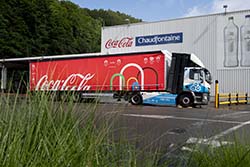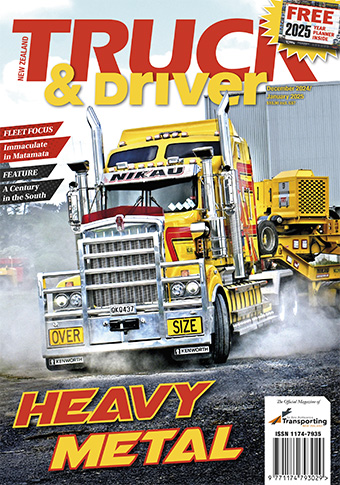
Toyota joins Coca-Cola for heavy-duty hydrogen fuel cell truck test
Posted: 01-Aug-2024 |
Toyota has started testing a new hydrogen-fuelled truck with Coca-Cola as part of the drinks company’s supply operations.
The truck’s fuel cell system uses modules which combine hydrogen and oxygen molecules to produce water, simultaneously generating electricity. As a result, water is the only tailpipe emission. The system offers the further benefit of fast refuelling.
Air Liquide, a leader in clean energy, is supplying the project with hydrogen sourced from renewables. The collaboration highlights the significance of the concurrent development of both vehicles and infrastructure to help foster a more sustainable society.
Toyota aims to support the decarbonisation of heavy-duty road transport with its hydrogen truck projects. Heavy-duty haulage accounts for a quarter of Europe’s freight transport, based on tonnes-per-kilometre carried. Commercial trucks’ usage patterns and their demand for large volumes of hydrogen make them key contributors to the development of sustainable hydrogen infrastructures.
This latest collaboration is another illustration of Toyota’s objective of supporting and contributing as much as possible to the establishment of carbon neutral societies in Europe and beyond.
Eric Desbonnets, Vice President Paris 2024 Operations, Coca-Cola, said: “We are pleased to partner with Toyota and Air Liquide to test hydrogen solutions for our long-distance logistics operations. We want to learn from this experience as we continue to work towards reducing our carbon footprint.”
Erwin Penfornis, Vice President Hydrogen energy World Business Line, Air Liquide: said: “Air Liquide shares the same ambition as Coca-Cola and Toyota: implementing concrete solutions to meet the challenge of energy transition. This collaborative project is part of such an approach and will demonstrate the relevance of hydrogen for heavy-duty mobility. With a growing call for products with a low carbon transportation footprint, hydrogen is particularly well-suited to long-distance transportation, providing flexibility and productivity.”




 + EQUIPMENT GUIDE - FREE
+ EQUIPMENT GUIDE - FREE
